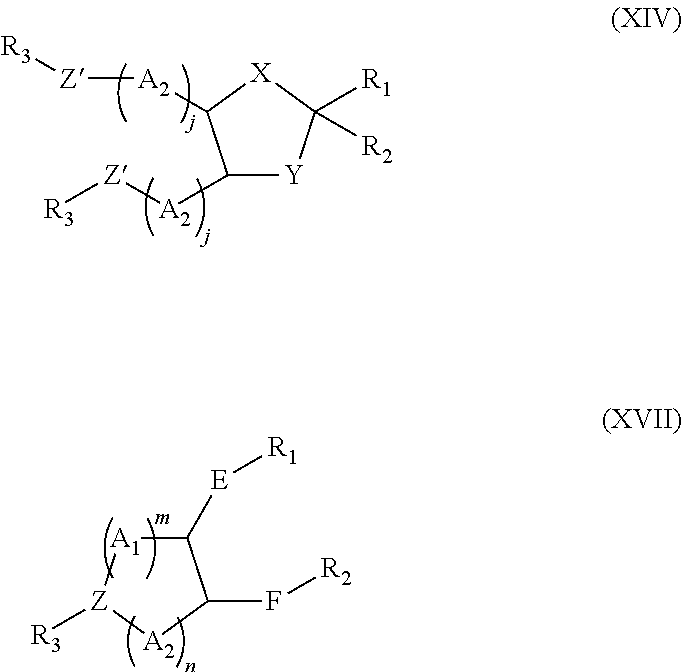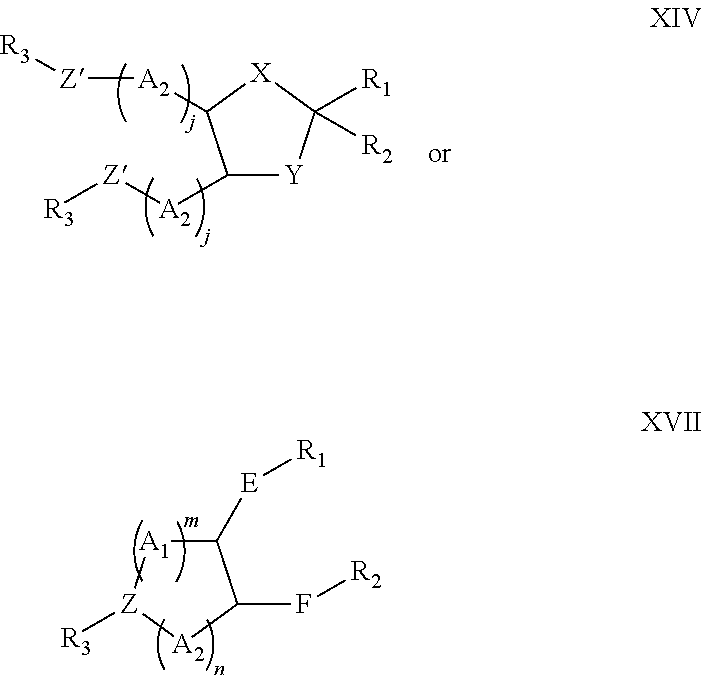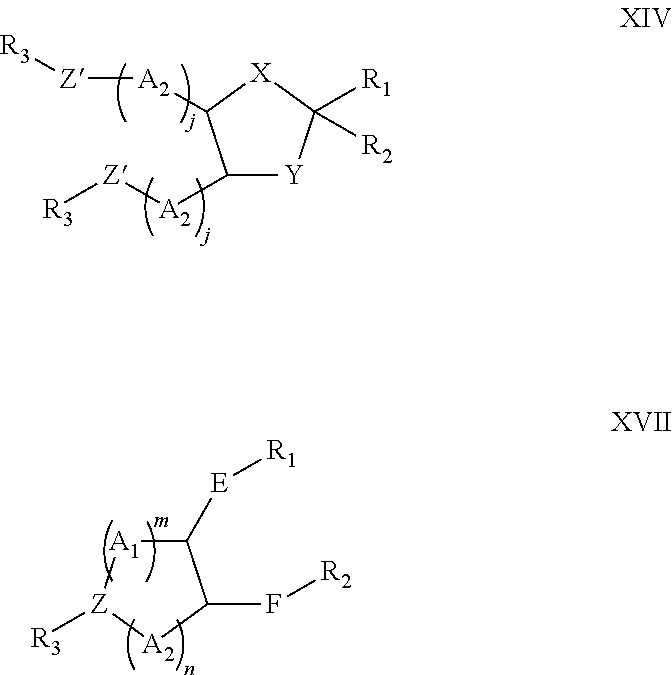Lipids and compositions for the delivery of therapeutics
- Summary
- Abstract
- Description
- Claims
- Application Information
AI Technical Summary
Benefits of technology
Problems solved by technology
Method used
Image
Examples
example 1
Synthesis of Methanesulfonic Acid Octadeca-9,12-Dienyl Ester 2
[0317]
[0318]To a solution of the alcohol 1 (26.6 g, 100 mmol) in dichloromethane (100 mL), triethylamine (13.13 g, 130 mmol) was added and this solution was cooled in an ice-bath. To this cold solution, a solution of mesyl chloride (12.6 g, 110 mmol) in dichloromethane (60 mL) was added dropwise and after the completion of the addition, the reaction mixture was allowed to warm to ambient temperature and stirred overnight. The TLC of the reaction mixture showed the completion of the reaction. The reaction mixture was diluted with dichloromethane (200 mL), washed with water (200 mL), satd. NaHCO3 (200 mL), brine (100 mL) and dried (NaSO4). The organic layer was concentrated to get the crude product which was purified by column chromatography (silica gel) using 0-10% Et2O in hexanes. The pure product fractions were combined and concentrated to obtain the pure product 2 as colorless oil (30.6 g, 89%). 1H NMR (CDCl3, 400 MHz) ...
example 2
Alternative Synthesis of the Ketone 7
[0322]
Synthesis of compound 6b
[0323]To a flame dried 500 mL RB flask, freshly activated Mg turnings (2.4 g, 100 mmol) were added and the flask was equipped with a magnetic stir bar, an addition funnel and a reflux condenser. This set-up was degassed and flushed with argon and 10 mL of anhydrous ether was added to the flask via syringe. The bromide 3 (26.5 g, 80.47 mmol) was dissolved in anhydrous ether (50 mL) and added to the addition funnel. About 5 mL of this ether solution was added to the Mg turnings while stirring vigorously. An exothermic reaction was noticed (to confirm / accelerate the Grignard reagent formation, 5 mg of iodine was added and immediate decolorization was observed confirming the formation of the Grignard reagent) and the ether started refluxing. The rest of the solution of the bromide was added dropwise while keeping the reaction under gentle reflux by cooling the flask in water. After the completion of the addition the reac...
example 3
Synthesis of Unsymmetric Ketones 25 and 27
[0325]
Synthesis of heptatriaconta-6,9,28-trien-19-one 25
[0326]To a dry 50 ml 2NRB flask, a freshly activated Mg turnings (132 mg, 0.0054 mol) was added and the flask was equipped with a magnetic stir bar and a reflux condenser. This setup was degassed and flushed with nitrogen and 10 mL of anhydrous ether was added to the flask via syringe. The bromide 24 (1.8 g, 0.0054 mol) was dissolved in anhydrous ether (10 mL) and added dropwise via syringe to the flask. An exothermic reaction was noticed (reaction initiated with dibromoethane) and the ether started refluxing. After completion of the addition the reaction mixture was kept at 35° C. for 1 h and then cooled in ice bath to 10-15° C. The cyanide 4 (0.5 g, 0.0018 mol) was dissolved in dry THF (5 mL) and added dropwise to the reaction with stirring. An exothermic reaction was observed and the reaction mixture was refluxed (at 70° C.) for 12 h and quenched with ammonium chloride solution. It w...
PUM
| Property | Measurement | Unit |
|---|---|---|
| Temperature | aaaaa | aaaaa |
| Temperature | aaaaa | aaaaa |
| Fraction | aaaaa | aaaaa |
Abstract
Description
Claims
Application Information
 Login to View More
Login to View More - R&D
- Intellectual Property
- Life Sciences
- Materials
- Tech Scout
- Unparalleled Data Quality
- Higher Quality Content
- 60% Fewer Hallucinations
Browse by: Latest US Patents, China's latest patents, Technical Efficacy Thesaurus, Application Domain, Technology Topic, Popular Technical Reports.
© 2025 PatSnap. All rights reserved.Legal|Privacy policy|Modern Slavery Act Transparency Statement|Sitemap|About US| Contact US: help@patsnap.com



